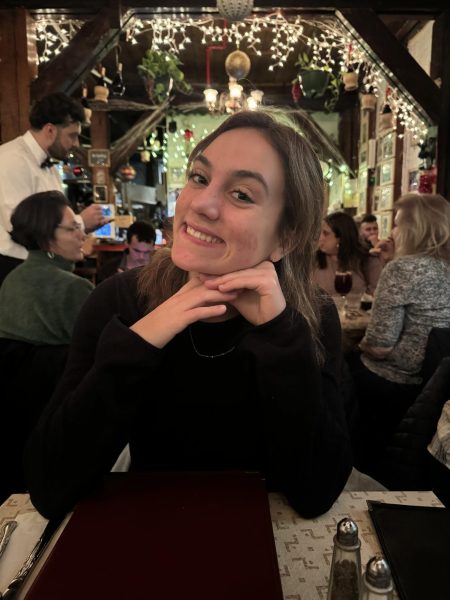'What I Eat In a Day' videos are promoting disordered habits to a ...
By Emma Siebold, Beacon Correspondent / 7 hours ago

Illustration by Kellyn Taylor.
Content warning: This column contains descriptions of disordered eating, body dysmorphia, and over-exercising.
A friend asked me why I wasn’t responding to the dozens of Instagram reels she was sending me through our DMs. I told her I had deleted Instagram again because I was racking up too much screen time, and she commended me for being able to do it. But I lied.
Screen time wasn’t the issue. It was the fact that every time I opened Instagram or TikTok, my explore pages were flooded with “what I eat in a day” videos, many of which were posted by women in their twenties and thirties and consisted of less than 1,500 calories a day. I was caught in the endless cycle of targeted content where once I engaged with a few videos about health and fitness, they were suddenly the only videos I ever saw.
As someone who struggles heavily with body image and eating, I thought these videos would help me, and that seeing someone eating a full day of healthy, satisfying meals would inspire me to do the same. Instead, I found myself constantly comparing my own diet and body to those influencers.
With over half of the global population on at least one social media platform, there are hundreds of harmful misconceptions about health and wellness out there. We’re in a new era of diet culture, and this time it’s masquerading as wellness.
Many of these diet influencers post their daily meal videos with the goal of promoting weight loss or “health,” but others blatantly advertise what they eat in a day “to stay skinny.” Even with the first kind, there’s the issue of what “health” even means—research shows that individuals have personalized health needs, and a diet that works for one person could be detrimental for another.
This new wave of supposed health influencers presents another problem. The majority of TikTok users are under 30 years old, the age range most likely to engage in disordered eating. People who take tips from social media health gurus at face value risk forming dangerous, unhealthy habits. Some of these influencers are registered dietitians and licensed nutritionists—but do people really know the difference?
Generally speaking, registered dietitians have undergone a degree program and professional training, compared to nutritionists, whose licenses and certifications vary by state. Dietitians have significantly more training and are more qualified than nutritionists to give actual medical and nutritional therapy. But nutritionists on social media are capitalizing on their impressionable viewers to give ill-informed advice, prompting them to eat like a nutritionist and therefore see results.
Some of these videos claim to promote eating disorder recovery and combat undereating videos, but senior journalism major Rachel Hackam agreed that they contribute to an “over-saturated market.”
“I think people making ‘what I eat in a day’ videos that go against diet culture is more of a Band-Aid than a solution,” Hackam said. “The only real way to solve the problem is to dismantle diet culture and to provide education on balanced nutrition.”
It’s also important to remember that “what I eat in a day” videos—regardless of influencers’ claims of authenticity—are curated like most other social media content. Of course they’re going to post the Insta-worthy avocado toast they had for breakfast and the perfect veggie bowl they ate for dinner.
What they’re probably not posting are the handfuls of snacks they grabbed on the way to class or in between meals because those aren’t aesthetic, and this destroys the false reality of eating the viewer has from watching such videos. Contrary to what these influencers say, it’s normal to eat snacks intuitively and eat meals that aren’t perfectly balanced. That’s life, especially as a teenager or college student. These purposeful omissions make people feel like they’re being unhealthy by eating normally, which is a dangerous comparison that can lead to serious mental and physical health issues.
I’m tired of people pretending like social media is reality when it’s not. My reality is telling my dad to stop cooking my favorite foods. Canceling plans with friends because I’m afraid to eat at restaurants. Falling into a hole that I can’t climb out of.
For those of you that are stuck in the cycle, who can’t hear anything over the food noise, know that you are not alone. At times, it can feel impossible to find any sort of peace in a society that values aesthetics over health, especially when there are untrained influencers whose goal is to prey on your insecurities. Influencers may be posting daily eating videos to promote a “balanced diet,” but they are instead contributing to comparison culture and causing serious harm.
About the Contributor
Emma Siebold (she/her) is a second-year journalism major with a health & society minor. She is from Spring Branch, Texas. She is also an associate producer for WEBN-TV and editorial assistant at Emerson Today. Outside of the newsroom, Emma enjoys training with the Dashing Whippets running team, listening to folk music, and obsessing over Marvel movies.




























![Soon Huat-Shevon charge into China Open final [WATCH]](/_largethumb/uploads/news/113/11375/3/11375323-soon-huat-shevon-charge-into-china-open-final-watch.jpg.webp)
![Soon Huat-Shevon charge into China Open final [WATCH]](/_newsthumb/uploads/news/113/11375/3/11375323-soon-huat-shevon-charge-into-china-open-final-watch.jpg.webp)













